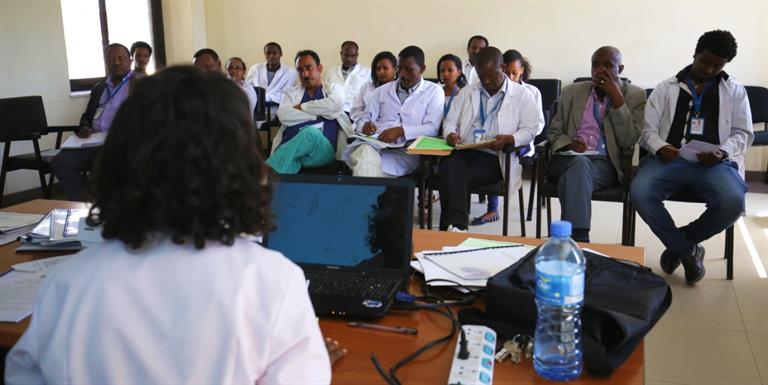Fifteen Sub-Saharan African countries and their partners met in Addis Ababa, to take stock of progress made in expanding access to medicines for their populations and progressing towards universal health coverage. The ‘Renewed Partnership to Strengthen Pharmaceutical Systems’, as the initiative is called, wraps up in September this year with numerous achievements and the hope that international support will continue to bolster Africa’s efforts to improve its health systems.
Donatien Bigirimana, who works as Medicines Adviser in the WHO Burundi office, says that the first thing patients ask when they front up to a health facility is: do you have medicines? “Medicines are the foundation of a health system,” he explains. “Without them, patients will not seek medical attention and health facilities lose credibility.”
Strong healthcare cannot exist without strong and well managed pharmaceutical systems.
says Dr Matshidiso Moeti, WHO Regional Director for Africa
But access to quality essential medicines is not a given in many sub-Saharan African countries and several other regions in the world. Largely due to resource constraints and lack of skilled personnel, low-income countries experience poor availability of essential medicines in health facilities, substandard quality treatments, frequent stock-outs and sub-optimal prescription and use of medicines. In addition, many patients in developing countries are not covered by health insurance and when sick are forced to pay for medicines out-of-pocket, often facing financial hardship as a result.
To address these challenges, the European Union in partnership with the African, Caribbean and Pacific Group of States and WHO has, for the last four years, worked with the governments of 15 African countries* to improve their pharmaceutical systems so that their populations can access the treatment they need. The partnership, in collaboration with ministries of health, has placed greatest emphasis on training and strengthening health workers’ capacity and awareness, guidance on sound pharmaceutical policies and good governance practices, and skills to monitor the quality of medicines and detect suspicious products that could be sub-standard or counterfeit and potentially dangerous.
“Money alone is not enough, particularly when it is directed at buying specific health commodities,” says Pauline Duya, a pharmacist in the Kenyan Ministry of Health who has collaborated on the project. “We need technical assistance on policies and best practices and enhanced capabilities to improve the system. That is where WHO is playing a critical role.”
As the project wraps up, the 15 countries and their partners met in Addis Ababa, Ethiopia, to discuss next steps and future actions to leverage progress made so far.
Over the four year project, the partnership has obtained impressive results. Some examples include:
- In Ethiopia, the Government has defined the list of priority medicines to be covered by the national insurance scheme, marking a first step towards universal health coverage
- Pricing surveys conducted in Burundi and Mali have led to new legislation fixing prices in the private sector to limit expenditure for patients
- Regulators from most of the 15 countries participated in training workshops to acquire additional skills to assess and register medicines more efficiently, so that quality treatments may be made available to patients
- Improved detection techniques have led to the increased capacity of Ethiopia and Mozambique to screen for substandard and counterfeit products at ports of entry
- National essential medicines lists were updated according to the most recent evidence to include more medicines for non-communicable diseases and treatments for children.1
With the project ending in September 2016, discussions in Addis Ababa will revolve around potential future funding and actions to be taken to ensure continual progress towards access to quality medicines and universal health coverage.

“We’ve seen many improvements, particularly in the availability of quality medicines in health facilities and strengthened capacities of staff in the sector,” says Dr Matshidiso Moeti, WHO Regional Director for Africa. “But good results require sustained efforts in the long term to obtain public health gains and reach universal health coverage. From countries we need to see greater commitment, higher investment and better governance. Strong healthcare cannot exist without strong and well managed pharmaceutical systems.”
1 Burundi, Cameroon, Congo, Democratic Republic of Congo, Ethiopia, Ghana, Guinea, Kenya, Mali, Mozambique, Senegal, Tanzania, Togo, Zambia, and Zimbabwe
